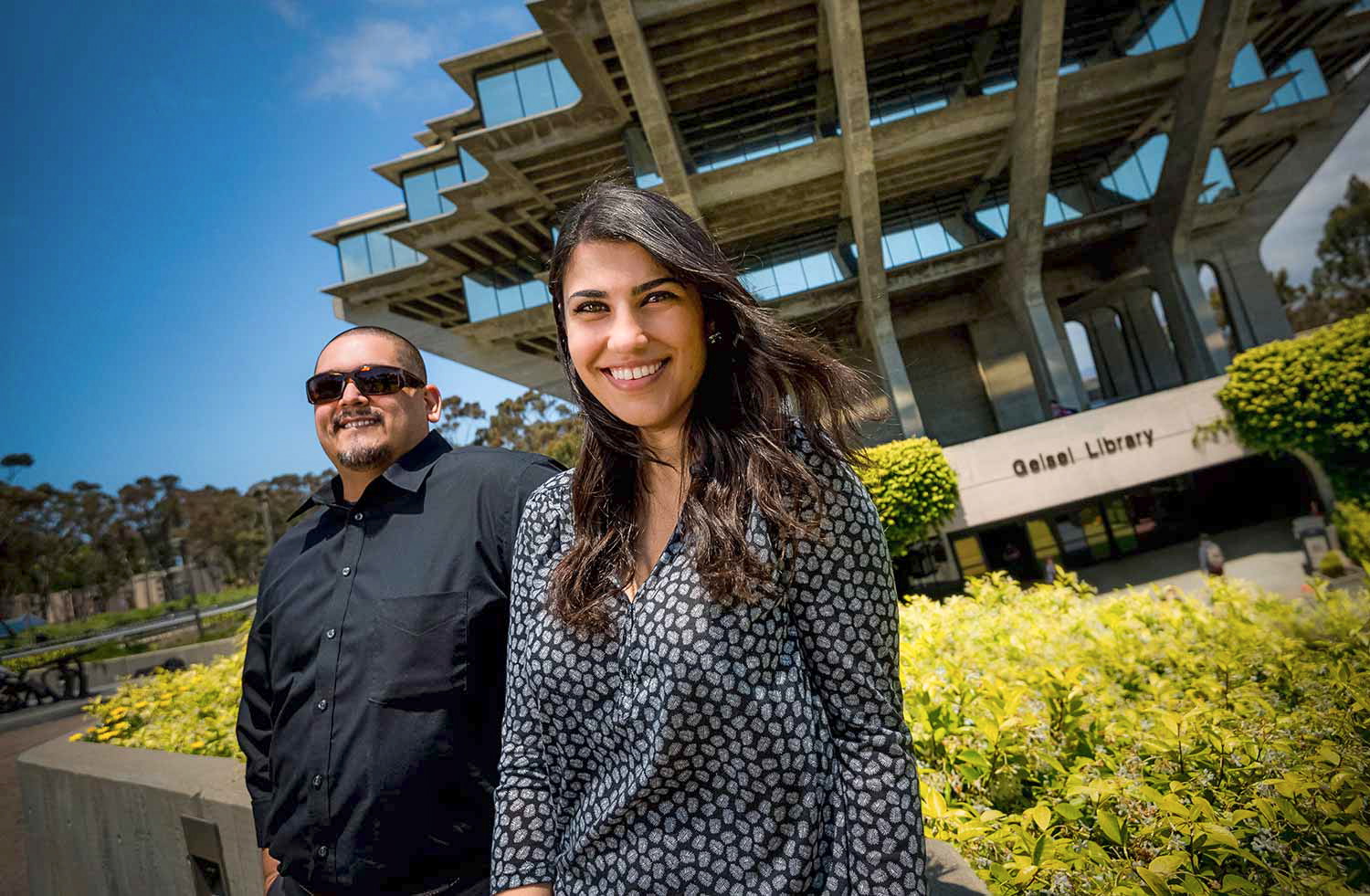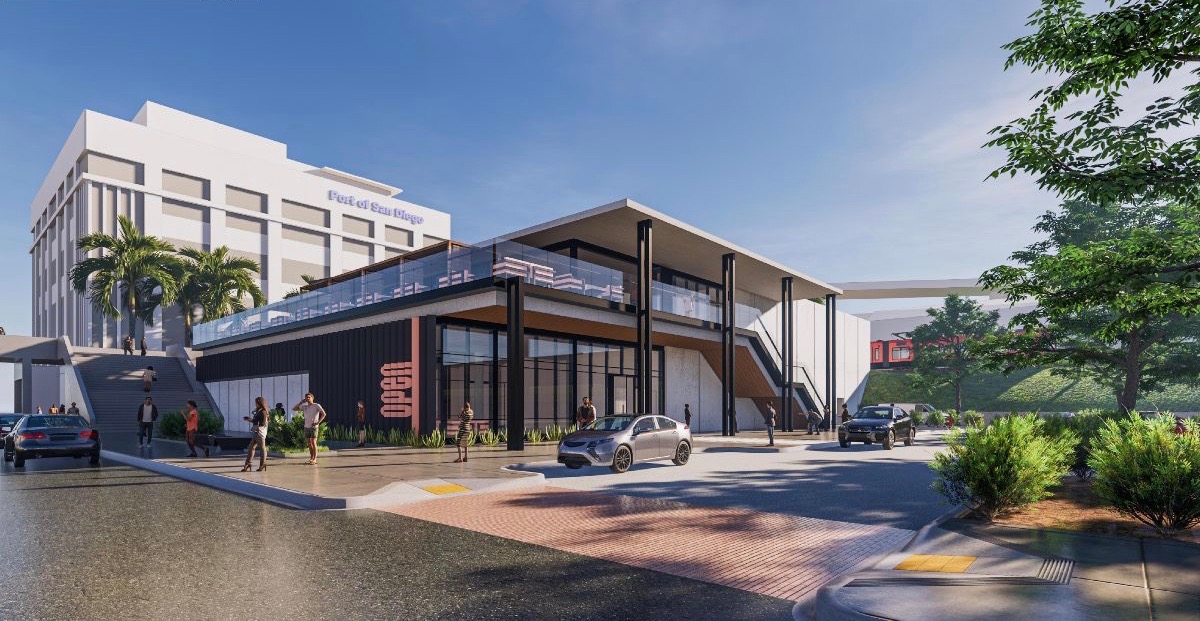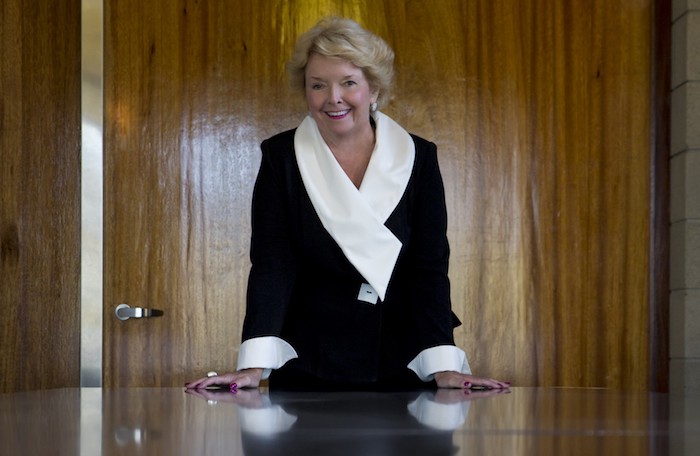Daily Business Report-May 17, 2016
Alberto ‘Beto’ Vasquez and Karina Mohajerani on the UC San Diego campus.
Student Speakers Selected to
Address UCSD Graduates at
All-Campus Commencement
By Christine Clark and Darlene Lopez
A father of four who went back to school at age 29 to provide a better future for himself and his children and a psychology major whose post-graduate plans include eradicating poverty have been selected to inspire new graduates to give back, as the student speakers for this year’s All Campus Commencement ceremony.
The event, at 10 a.m. on Saturday, June 11, will mark the first time in 16 years that UC San Diego will convene all of its graduating undergraduate and graduate students for a campuswide commencement ceremony.
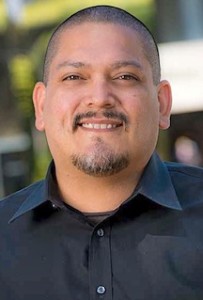
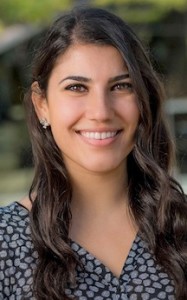
As part of the revival of this campus tradition, there will be a graduate student speaker, Alberto “Beto” Vasquez, and undergraduate student speaker, Karina Mohajerani, who will share their personal stories and encourage the class of 2016 to be of service to the community and the world. Their speeches will echo sentiments of the event’s keynote speaker, Nobel Peace Prize recipient Muhammad Yunus, a social entrepreneur, economist and founder of the global microfinance movement who was selected for embodying UC San Diego’s ideals of public service, social mobility and global citizenship.
Mohajerani shares Yunus’s passion for helping others. As this year’s undergraduate student speaker, Mohajerani wants to convey to graduating students that they are equipped with the tools to make a difference in their community and in the world, no matter which path they choose. Originally from San Jose, Mohajerani transferred from a California Community College to UC San Diego to major in psychology and minor in business. Along with participating in four research laboratories on campus, she volunteers for various student organizations. As such, Mohajerani volunteers with UC San Diego Intervarsity’s Homeless Ministry in which she and other students make weekly trips to Downtown San Diego to distribute sandwiches and water, as well as blankets umbrellas and other supplies as needed. They also converse and engage with members of the local homeless community.
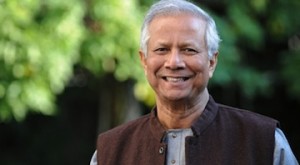
“Since attending UC San Diego, I have immersed myself in campus life and have tried to become a part of as many organizations, research laboratories and societies as I possibly could,” she said. “I am so grateful for all of the opportunities this campus has presented me.”
Mohajerani is inspired to be of service to the world by empowering others and plans on working with social businesses to address poverty after graduation.
Muhammad Yunus helped define social businesses in his book, “Creating a World without Poverty: Social Business and the Future of Capitalism.” Similar to nonprofit organizations, social businesses designate all profits to be reinvested in the business itself (or used to start other social businesses), with the aim of increasing social impact; for example, expanding the company’s reach, improving the products or services, or in other ways subsidizing the social mission.
Not surprisingly, Yunus has had a big influence on Mohajerani. Yunus is known for pioneering the concepts of microcredit and microfinancing and was awarded the Nobel Peace Prize in 2006 for founding the nonprofit Grameen Bank in Bangladesh, which is credited for lending billions of dollars in loans to impoverished entrepreneurs in an attempt to eradicate poverty.
“When I first read the announcement that Muhammad Yunus would be speaking at the All Campus Commencement ceremony, I was absolutely enthralled,” she said. “Having a Nobel Peace Prize recipient as this year’s guest speaker is already a noteworthy experience; furthermore, his work with social businesses is exactly what influenced me to take the career path that I have chosen.”
Graduate student speaker “Beto” Vasquez wants to create futures in STEM education for women and people of color. Being of service to the community is not only a theme, but a way of life for Vasquez. He transferred to UC San Diego from San Diego City College and, after earning his bachelor’s degree in biology at the campus, is now earning a master’s degree in the same field.
As a first-generation college student, Vasquez’s educational journey has been both challenging and rewarding. Nearing 30, he returned to school to change the trajectory of his life. “I decided to return to school to better provide a better future for my children and myself,” Vasquez said.
He then found his passion when a professor at San Diego City College taught him about what he refers to as the “beauty and magnificence of biology.”
“When I first enrolled at San Diego City College, I was overcome with a sense of clarity and direction unlike any other time before,” said Vasquez.
His speech will focus on his personal journey, the importance of being genuine and why individuals should give back to themselves, their families and their communities.
Vasquez also works for the City of San Diego as a council representative, where he strives to meet the needs of, and develop relationships with, various groups within the region. Additionally, he works with the San Diego Community College District, educating the public about the accessibility and affordability of higher education.
Vasquez hopes to become a community college biology professor, and ultimately an administrator in higher education. He plans on pursuing a doctoral degree in education and leadership, identifying practices to optimize the enrollment and retention of students from underserved communities. Vasquez is constantly looking for ways to increase interest in science, technology, engineering and math (STEM) research among students of color and women who are underrepresented in these fields.
“I am aware of some of the issues that often hinder the ability for more students to embrace and be successful in STEM degrees, and am prepared to address them,” he said. “I am continually collaborating with numerous campuses and community groups to enhance educational outreach efforts, and validate students to increase their sense of belonging in these disciplines.”
__________________________________________
Gannett Raises Newspaper Bid to $864M
Gannett has raised its offer for Tribune Publishing Co. to $15 per share, up from $12.25 per share, according to the SEC. The revised offer puts the price for the company, which includes the Los Angeles Times and The San Diego Union-Tribune, at $864 million. Read more…
_______________________________________
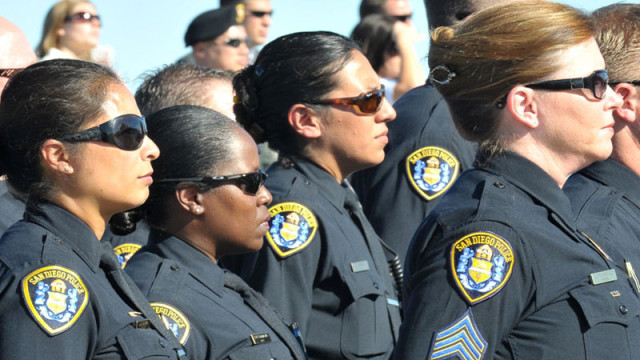
City of San Diego and Unions
Reach Tentative Contract Agreements
By City News Service
The city of San Diego reached tentative contract agreements with three employee unions that will provide pay raises beginning July 1, 2018, the mayor’s office announced Monday.
The contract with deputy city attorneys, if approved by the City Council, would run until June 30, 2019. The tentative deals with tradesmen belonging to the American Federation of State, County and Municipal Employees Local 127, and lifeguards in Teamsters Local 911, would run to June 30, 2020.
The mayor’s office said the employees approved the agreements by wide margins.
“With these new agreements, we’re continuing pension reform while at the same time offering fair contracts that include benefits like paid parental leave,” Mayor Kevin Faulconer said.
“As we grow our economy, we’re investing more in our neighborhoods by paving more roads, building new and improved parks, and keeping our libraries and rec centers open longer,” Faulconer said. “These contracts recognize that these improvements are only possible thanks to the employees who deliver neighborhood services day in and day out.”
According to the mayor’s office, provisions of the agreements include:
— 3.3 percent pay raises in Fiscal Years 2019 and 2020, which come after a voter-approved freeze on most compensation increases expires;
— paid parental leave of 160 hours time off for the birth, placement or adoption of a child;
— bereavement leave of 40 hours for all full-time employees, with step- parents, step-siblings and grandparents, grandchildren, mother-in-law and father-in-law added to list of covered deaths;
— a doubling of the annual tuition reimbursement benefit from to $2,000 for education and job-related training; and
— increases in flexible health care benefits of $1,500 in the upcoming fiscal year and $1,650 in Fiscal Year 2018.
The tentative contracts also provide for specialty and special assignment pay for a handful of jobs to address recruitment and retention issues. Those include wastewater plant operators, fleet technicians, select deputy city attorney positions, boat operators, electricians, fleet employees with a Class B license, mobile crane operators, greens keepers and nursery gardeners.
“This is an exceptionally fair contract that will help improve operations and better protect our beaches and bays,” said lifeguard Chief Rick Wurts.
“For example, by converting the boating safety unit to a specialty team, we’ll be able to offer more extensive training and increase the capabilities of lifeguards who pilot fireboats,” Wurts said. “This agreement well positions the San Diego Lifeguard Service to continue to employ the best skilled, best trained lifeguards around.”
The San Diego Police Officers Association and Municipal Employees Association, which represents white-collar workers, previously agreed to similar deals. The city is still negotiating with firefighters.
___________________________________________

Nonpartisan Crowdfunding Startup
Maps Candidates, Ballot Measures
Crowdpac, a nonpartisan political crowdfunding site, unveiled an interactive sample ballot for the California Presidential Primary Election specifically designed for San Diego County, using public campaign finance data to provide unprecedented information to voters.
Crowdpac’s free voting tool is accessible via any browser and allows citizens to quickly decode the politics of the candidates in all federal, state, county and city races, as well as donate to all the candidates they support with a simple click.
The data for the new San Diego ballot guide is based on Crowdpac’s algorithm, which maps politicians — from presidential hopefuls to state legislators to local candidates — on a liberal/conservative scale based on what they say, how they vote and most importantly, who gives them money. San Diego is the third city in the nation to have local campaign finance records integrated with Crowdpac’s database of every state and federal political donation made since 1980.
“During Presidential cycles, local candidates and elections often get lost in the mix although they are equally critical in shaping government and public policy,” said Mason Harrison, Crowdpac’s political director. “One of the reasons for that is a simple lack of information about down-ticket contests, which voters frequently skip altogether. But with Crowdpac’s unique data and simple tools, anyone can work out which candidates and ballot measures to support within minutes. It’s no use complaining about politics if you don’t participate. We hope this new tool will result in an increase in political engagement throughout the county.”
You can view the website here.
___________________________________________
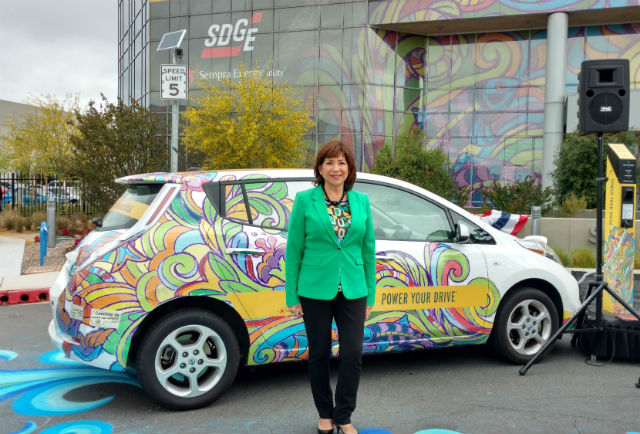
SDG&E Launches $52.5 Million
Program to Encourage EV Use
Times of San Diego
San Diego Gas & Electric on Monday kicked off a $52.5 million investment in charging stations and education programs to entice San Diegans to switch to electric vehicles over the next five years.
Jeff Martin, the utility’s chairman, president and CEO, said the goal of the “Power Your Drive” program is to make San Diego “America’s EV and clean-energy capital.”
The utility will begin installing 3,500 new chargers at businesses, in multi-family communities and in disadvantaged neighborhoods beginning early next year. The chargers will take advantage of growing solar energy production, and offer users special low rates during the day. Martin said EV owners will “literally drive on sunshine.”
There are currently over 20,000 electric vehicles on the road in San Diego County, and that number is expected to grow to 80,000 by 2020.
At a press conference announcing the program, representatives of 20 organizations ranging from Bayview BaptistChurch to Jewish Family Service to SeaWorld San Diego were on hand to announce their commitment to install the chargers and promote electric vehicle use.
Chula Vista Mayor Mary Casillas Salas, whose city will get 60 of the chargers, said the investment will spur electric vehicle use by overcoming consumers’ “anxiety about where to plug in their cars when they leave their homes.”
San Diego Mayor Kevin Faulconer said the city was considering converting its fleet to electric power. He said the SDG&E program is another example of making San Diego “a model for fighting climate change.”
In addition to the new chargers, SDG&E plans to spend $7.5 million on consumer education, including ride-and-drive events throughout the county to introduce electric vehicles to the driving public. At the events, consumers will be able to test drive all makes and learn about tax credits and rebates that can total $10,000.
San Diego City Councilman Mark Kersey, who owns a Tesla, noted that while electric vehicles are good for the environment and reduce dependence on imported oil, it’s really about the driving. “The cars are just plain fun to drive — that is, if you like torque and going fast,” he said.

